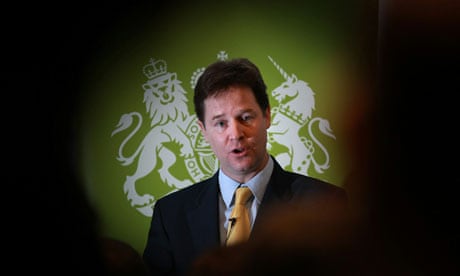Nick Clegg today promised to end virtual house arrest, contained in the current anti-terror control orders regime, but for the first time admitted that the government will retain restrictions for a small group of terror suspects who cannot be prosecuted in the British courts.
The former Labour home secretary John Reid, a supporter of control orders, said it was clear the deputy prime minister was backing off from plans to abolish the central thrust of the measures.
Liberty said it would not be satisfied if the government announced a control orders-lite regime.
Negotiations are continuing across Whitehall, and the aim is to publish the result of the counter-terror review next week.
The Liberal Democrat manifesto called for the scrapping of control orders, and although it is clear they will be significantly reformed, Clegg has accepted that a less onerous and more proportionate replacement regime will be required.
In a wide-ranging speech on liberty , the deputy prime minister admitted that the compromise, painstakingly being crafted inside Whitehall, would not satisfy purists on either side.
He said: "We need to deal with an inescapable reality that there are a small number of people who we know – and, by the way, the judges who have been overseeing the process know – want to cause immense damage to us, and for some reason or other, good or bad, we are not able to get them into courts."
He said there was a dilemma and a need for balance. "I do not think it is justifiable to impose what is virtual house arrest without having been able to charge or convict someone first.
"That I think is very clear. That is one of the flaws of the current system that we are seeking to address."
Asked three times, he refused to confirm that the abolition of house arrest would involve the abolition of curfews, currently imposed for as long as 16 hours a day.
Government sources said ministers were looking at a package involving reducing curfews, ending relocation orders requiring terror suspects to leave their community, and electronic tagging.
The former government adviser on terror, the Liberal Democrat peer Lord Carlile, has insisted curfews must remain. Today, he welcomed the shift in Clegg's thinking, but made it clear that he thought he would have to accept curfews.
He said: "A better way maybe to bring control orders to an end is to produce a new regime, a public protection scheme, but one which will retain the essential elements of control orders that do protect the public.
"I'm afraid that although forced relocation may not be necessary or appropriate, some element of curfew almost certainly is and I would hope that new proposals will reflect that."
Liberal Democrats are still pressing for surveillance and tagging to replace control orders, but the security services would prefer continued curfews.
One Liberal Democrat closely involved in the issue said he could live with nocturnal eight-hour curfews.
There is also likely to be a lifting of restrictions on the use of phones and computers, as long as they are government owned.
Clegg said yesterday: "It's clear that there are some very hard measures in the existing control orders. I am going to change it. What I am not prepared now to say is what aspect of the regime is going to change. That is very complex.
He added: "The principle that virtual house arrest be applied to people who are not convicted of crimes in the courts is a principle that I am deeply, deeply uncomfortable with."
Denying that there had been an almighty row in government, Clegg said: "I can predict very safely [that] the people who think control orders are perfect will be disappointed, and the people who think all we have to do is just scrap them and do nothing else will be disappointed as well. We are dealing with a difficult set of dilemmas."
Responding to claims by the shadow home secretary, Ed Balls, that he was involved in constructing a political deal to save his reputation, he said it was "nonsense" to suggest that decisions on anti-terror measures were being taken through a "party political prism".
The government's first duty was "to keep the British people safe" and the threat from terrorists was "very, very real".
In the speech Clegg also outlined previously trailed plans to reform libel laws and to strengthen the freedom of information regime.
He launched a damning assault on the previous government's record on civil liberties, saying there had been nothing casual about the way in which the Labour government had eroded individual freedom over a decade.
"This government is restoring British liberties with the same systematic ruthlessness with which Labour took them away. None are too big or too minor, and we want to leave no stone unturned."
